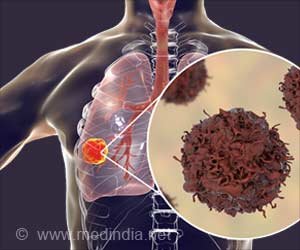BRCA1 Gene Mutation Puts You at Risk of Developing Aggressive Cancer

The body also has a defense mechanism against these strand breaks that uses a protein encoded by the gene BRCA1. However, in people with a BRCA1 mutation, an inherited condition, the defense against these strand breaks is limited. This makes such individuals particularly susceptible to MM.
A group led by Professor Shinya Toyokuni of Nagoya University’s Graduate School of Medicine and Center for Low-temperature Plasma Sciences, in collaboration with the University of Tokyo and the National Institutes for Quantum Science and Technology, studied MM caused by exposure to white asbestos in BRCA1 mutant rats.
Advertisement
They found that ferroptosis-related proteins were significantly reduced in BRCA1 mutant rats a few weeks after exposure to white asbestos. Similarly, MM of mutant rats had dysregulation of iron metabolism, such as decreased stable ferric iron and expression of ferritin, both of which are important in ferroptosis. At the genetic level, they also found that the tumor had upregulated two of its genes, Slc7A11 and Gpx4, which are known to lead to ferroptosis-resistance.
Although the exact mechanism is unknown, Toyokuni has a hypothesis. “Our understanding is that the mitochondria, a key organelle of iron metabolism, are more susceptible to damage, which accumulates more iron intracellularly and in the extracellular environment nearby,” he said.
Although these are still early days, Toyokuni believes that their experiment has important implications for people with BRCA1 mutations. “I would recommend people with BRCA1 mutations who are exposed to asbestos to monitor chest x-rays regularly and perform regular blood donation, which showed some prevention effects in animal models. We want to emphasize that avoiding exposure to white asbestos is especially important for people with BRCA1 mutations.”
Source: Eurekalert
Source link
#BRCA1 #Gene #Mutation #Puts #Risk #Developing #Aggressive #Cancer



